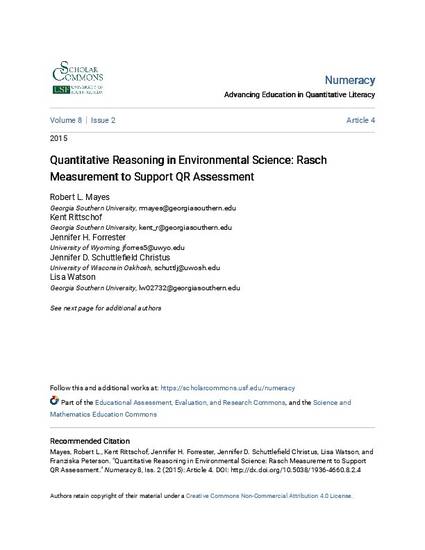
Original work is hosted at USF Libraries Scholar Commons publisher of Numeracy, the electronic journal of the National Numeracy Network (NNN).
Abstract : The ability of middle and high school students to reason quantitatively within the context of environmental science was investigated. A quantitative reasoning (QR) learning progression, with associated QR assessments in the content areas of biodiversity, water, and carbon, was developed based on three QR progress variables: quantification act, quantitative interpretation, and quantitative modeling. Diagnostic instruments were developed specifically for the progress variable quantitative interpretation (QI), each consisting of 96 Likert-scale items. Each content version of the instrument focused on three scale levels (macro scale, micro scale, and landscape scale) and four elements of QI identified in prior research (trend, translation, prediction, and revision). The QI assessments were completed by 362, 6th to 12th grade students in three U.S. states. Rasch (1960/1980) measurement was used to determine item and person measures for the QI instruments, both to examine validity and reliability characteristics of the instrument administration and inform the evolution of the learning progression. Rasch methods allowed identification of several QI instrument revisions, including modification of specific items, reducing number of items to avoid cognitive fatigue, reconsidering proposed item difficulty levels, and reducing Likert scale to 4 levels. Rasch diagnostics also indicated favorable levels of instrument reliability and appropriate targeting of item abilities to student abilities for the majority of participants. A revised QI instrument is available for STEM researchers and educators.
 This work is licensed under a Creative Commons Attribution-Noncommercial 4.0 License
This work is licensed under a Creative Commons Attribution-Noncommercial 4.0 License
Available at: http://works.bepress.com/robert_mayes/244/
